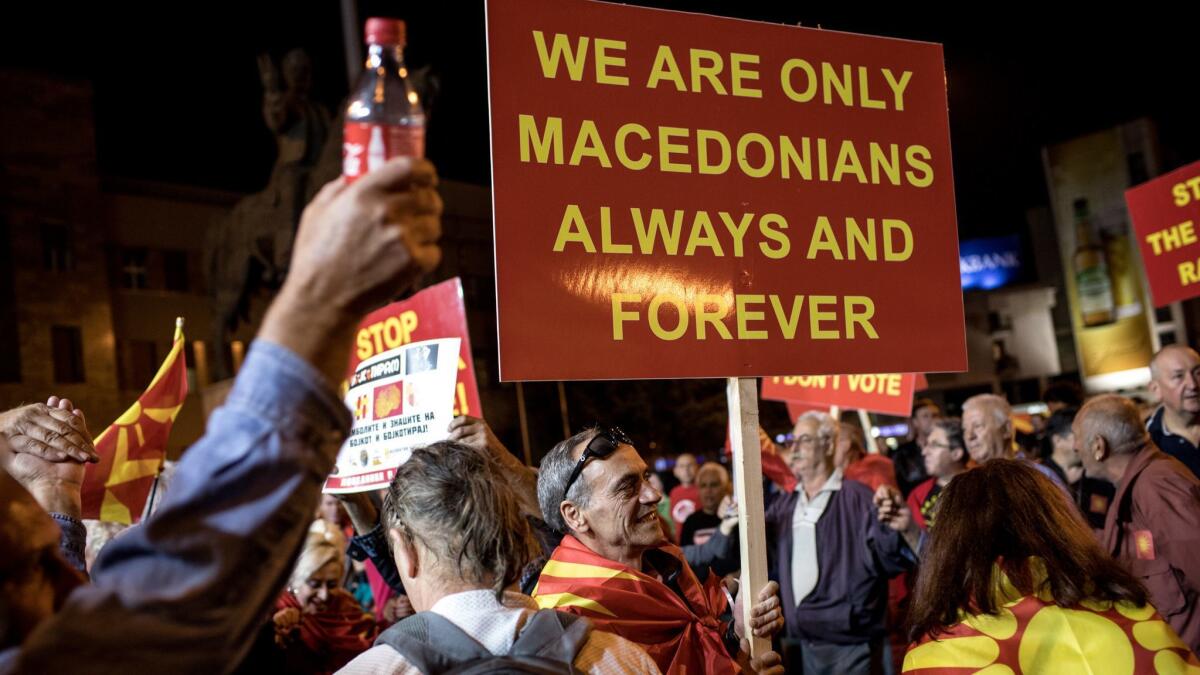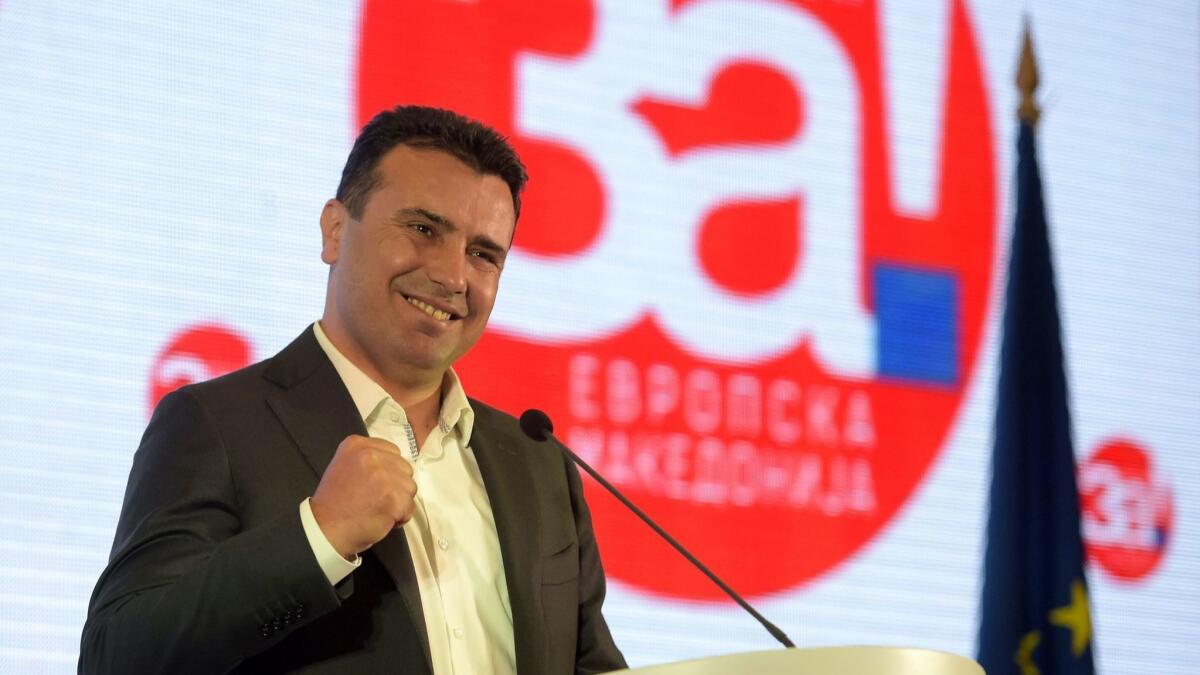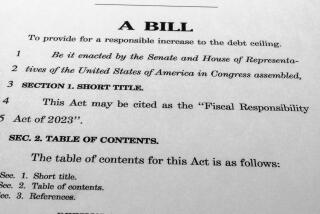Macedonians just voted to change the name of their country â but the vote may not count

Reporting from Athens â It was hailed as the breakthrough of a generation, a deal that would end a dispute that had festered for 27 years and consolidate peace in the Balkans.
When the tiny Republic of Macedonia emerged from the collapse of Yugoslavia in 1991, it had caused alarm in neighboring Greece, which already had a region called Macedonia, which included the nationâs second-biggest city and port of Thessaloniki.
In June, the two sides finally hashed out an agreement under which Macedonia would be renamed the Republic of North Macedonia and, in turn, Greece would lift its objections to the state becoming a member of the European Union and of NATO. The agreement, which could lift Macedoniaâs isolation and stem Russian influence in the region, was signed on the shores of Lake Prespa, which spans the countriesâ borders.
But on Sunday, the people of the prospective North Macedonia failed to provide the resounding approval that Prime Minister Zoran Zaev hoped for. In a referendum among the nationâs 2 million people, only 36.9% turned out to vote, failing to meet the 50% threshold for participation, even as 91.5% of those who voted approved the pact. The low turnout rendered the non-binding poll invalid.

Some Macedonians celebrated the result by dancing in the streets, holding placards saying: âStop the Greek genocideâ and âThis was, is and will remain Macedonia.â
âWe knew that it was on the cards as there seemed to be this groundswell of opposition to the agreement with people feeling disgruntled about having to change the name of their country and their identity,â said James Ker-Lindsay, an expert on southeast Europe at the London School of Economics. âIt came out as âLetâs boycott thisâ rather than an outright âno.ââ
Zaev has said he will carry on with the ratification of the agreement and the next step of changing the constitution. But he will need the support of opposition lawmakers to push those through and the lackluster referendum result means he is unlikely to sway them to fall behind him. Otherwise, Ker-Lindsay says, fresh elections are the option.
When Yugoslavia dissolved, the region that had been the Socialist Republic of Macedonia achieved independence without the bloodshed seen in the other Yugoslav states. But by keeping the name of Macedonia, it stoked fear and fury among Greeks who suspected it would make territorial claims on their territory. Those concerns grew when the main airport in the capital, Skopje, was called âAlexander the Greatâ in a move seen by Greeks as claiming the heritage of the ancient Greek king, who hailed from the ancient region of Macedonia and went out from there to conquer the known world.
Amid boycotts and protest marches in Thessaloniki, Greece insisted on a name change and vetoed the neighborâs bid to join NATO and the European Union.
In a flurry of diplomatic activity earlier this year, Greece and the former Yugoslav republic carved out a compromise. In addition to the new name, the deal clarifies that the people of North Macedonia are unrelated to the ancient Greeks. Their language is part of the Slavic family, unrelated to ancient Greek.
The new name would be used both internationally and bilaterally, so that the countries that recognize Macedonia would have to change their recognition to North Macedonia. The new name would be approved by the Macedonian people in the referendum and by the Greek parliament.
There was still opposition. In Athens and Thessaloniki, thousands rallied, chanting that there was only one Macedonia and that it was Greek. In Skopje, President Gjorge Ivanov said the agreement was in violation of the countryâs sovereignty.
In a joint statement Monday, President Donald Tusk of the European Union and Secretary-General Jens Stoltenberg of NATO said the agreement, if ratified, âwould change the life of the people of the country and that of their children for the better.â
âIt is now in the hands of politicians in Skopje to decide on the way forward,â the two added. âThe decisions they take in the next days and weeks will determine the fate of their country and their people for many generations to come. We encourage them to seize this historic opportunity.â
U.S. State Department spokeswoman Heather Nauert similarly praised the agreement and called for its âfull implementation, which will allow Macedonia to take its rightful place in NATO and the EU, contributing to regional stability, security, and prosperity.â
If Zaev manages to deliver his part of the deal, it would then be the turn of Greek Prime Minister Alexis Tsipras, who will have to contend with opposition from his junior government partner. The Greek opposition has already said it will vote against the Prespa agreement in parliament.
âWe needed a good news story,â said Ker-Lindsay about the Balkans, where tensions over Macedonia, Kosovo and Serbia, and Bosnia continue. âTo get rid of one of them would have been a tremendous step forward.â
Petrakis is a special correspondent.
More to Read
Sign up for Essential California
The most important California stories and recommendations in your inbox every morning.
You may occasionally receive promotional content from the Los Angeles Times.










